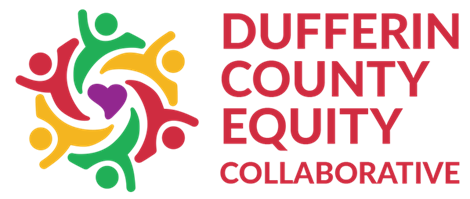From Poverty to Equity: Expanding the Lens
From Poverty to Equity: Expanding the Lens in Dufferin County
By Anna McGregor
April 2022
 When you think of the word poverty, what do you see? Many see visions of people without access to drinking water in faraway places or of sprawling metropolises with rough-looking, crime-ridden neighborhoods. Most people have a hard time seeing poverty in their own charming little town, even though it exists. Poverty doesn’t always resonate with all people and all human service providers in the same way.
When you think of the word poverty, what do you see? Many see visions of people without access to drinking water in faraway places or of sprawling metropolises with rough-looking, crime-ridden neighborhoods. Most people have a hard time seeing poverty in their own charming little town, even though it exists. Poverty doesn’t always resonate with all people and all human service providers in the same way.
The Dufferin County Equity Collaborative (DCEC) officially formed in 2018. It was created when the Dufferin County Poverty Reduction Task Force (PRTF) and the Local Health Integration Network (LHIN) Poverty Sub-Collaborative recognized they could benefit from combining their skills and knowledge.
The two groups came together because they recognized there was duplication between PRTF and LHIN Poverty Working Group; there was a strong desire to get better at information sharing, data collection and planning.
 How do you engage more human service providers and keep your health colleagues at the table at the same time? When the group started talking about equity; that’s when people could see the sell to their senior management and/or boards. They could see it was something they could sign up to. Equity versus Poverty Reduction was about really expanding the lens to look at all barriers, all people and to apply a system focus. Having all sectors come to the table for defining issues and solutions brings all perspectives and experience from that broader service knowledge to work together for specific focus and greater impact.
How do you engage more human service providers and keep your health colleagues at the table at the same time? When the group started talking about equity; that’s when people could see the sell to their senior management and/or boards. They could see it was something they could sign up to. Equity versus Poverty Reduction was about really expanding the lens to look at all barriers, all people and to apply a system focus. Having all sectors come to the table for defining issues and solutions brings all perspectives and experience from that broader service knowledge to work together for specific focus and greater impact.
The equity lens for the collaborative focuses on goals designed to ensure everyone in the Dufferin community has a range of opportunities so they can be successful, regardless of their starting point. DCEC recognize that equity is achieved when each individual can reach their full potential and are not disadvantaged from attaining it because of barriers.
To make sure things were set up for success, the members around the table created a sub working group who collectively created new Terms of Reference for new combined group. This was viewed as a necessary step to truly demonstrate the cross sectoral support. The newly formed table then appointed Chairs from the municipality and from the local public health. Again, a very visible collaboration.
The group recognised that even though they were making great strides around the table and information sharing, data gathering and planning were less of an uphill struggle; it was still only really visible to those involved.
 Then began the collaborative work with the Tamarack Institute. The first DCEC report was developed with the support of Tamarack Institute – Vibrant Communities’ Getting to Impact program. The Getting to Impact coaching series is a voluntary coaching program, which provides a high-level framework to assist with organizing and understanding poverty and poverty reduction, and to effectively measure and communicate the impacts of poverty reduction efforts to local stakeholders.
Then began the collaborative work with the Tamarack Institute. The first DCEC report was developed with the support of Tamarack Institute – Vibrant Communities’ Getting to Impact program. The Getting to Impact coaching series is a voluntary coaching program, which provides a high-level framework to assist with organizing and understanding poverty and poverty reduction, and to effectively measure and communicate the impacts of poverty reduction efforts to local stakeholders.
The reports to the community provide an update on the key activities DCEC has undertaken over the previous year and the outcomes and impacts that have emerged from that effort. It is a summary of progress made in the year and it acknowledges the efforts of those who have contributed to a successful year. Let’s be clear here, DCEC recognize that no one agency, or one level of government can tackle the challenges we see in human services. It will be the collective work and partnerships communities do that will make an impact.
By bringing people to the table who can see their work reflected in collaborative, Dufferin have been able to capitalize on their human services partnerships, to better help those they serve.
For the reports published to date, please see: Dufferin County Equity Collaborative • DC MOVES - Dufferin County - Dufferin County Managing Organising Validating Engagement Strategies
About the Author

Anna McGregor has been at the County of Dufferin since 2010. She is currently the Director of Community Services and oversees programming for Ontario Works financial and employment services, Housing and Homelessness services and Child Care and Early Learning services. Many in the human services field recognise the Dufferin accent on conference calls.
The County of Dufferin is one of Ontario’s smallest social services Service Manager Areas in Ontario. Anna would argue small and mighty.
Before joining Dufferin, Anna had a few years’ experience as an Ontario Works Manager and before that, nearly 2 decades of experience in Scottish local government; working for 3 different local government bodies. Her roles have included everything from the office go to person, administration officer, development officer, accountant, auditor and college lecturer.
All of which resulted in a very broad and eclectic work experience, just the sort of experience needed for a small and mighty Service Manager.